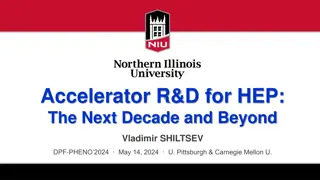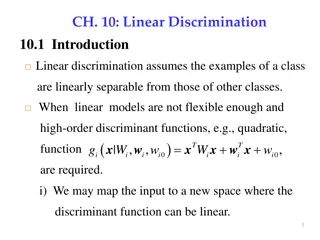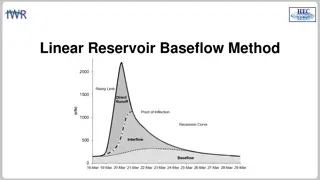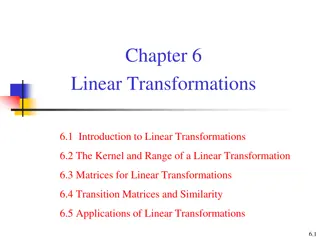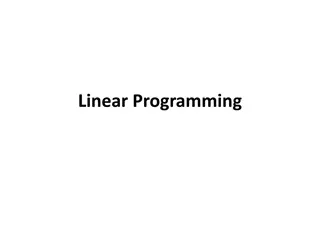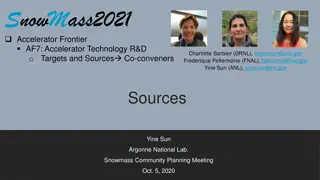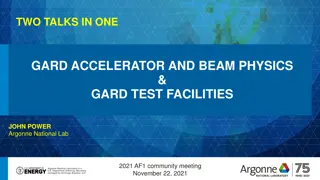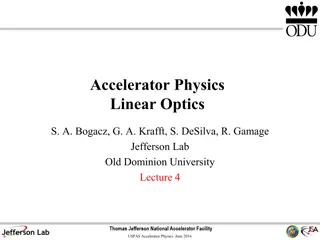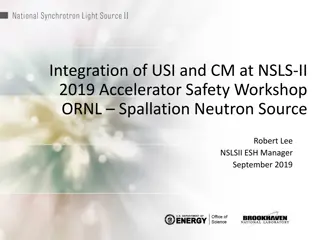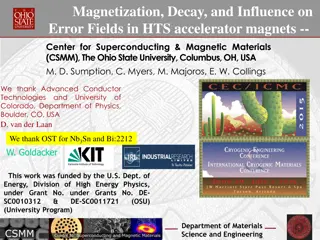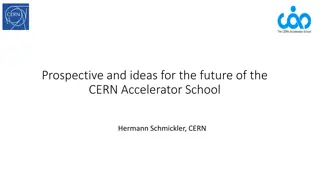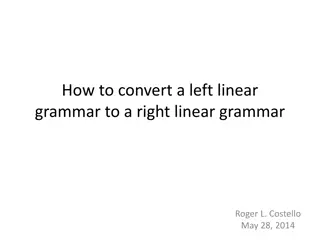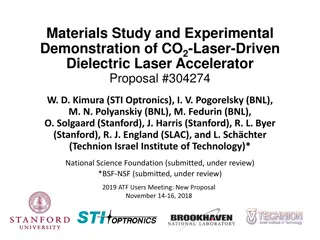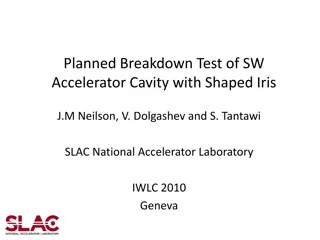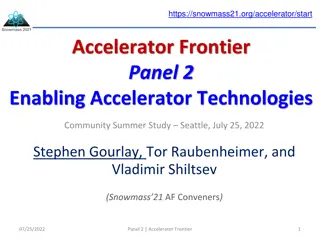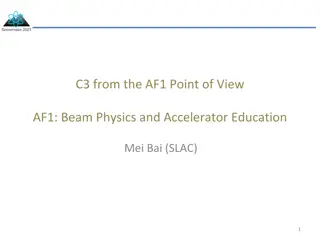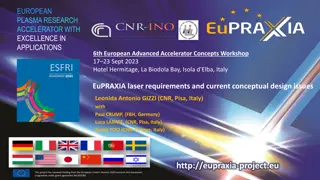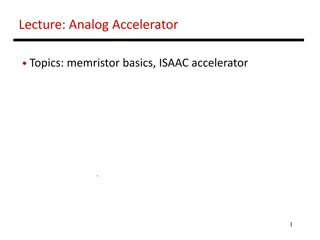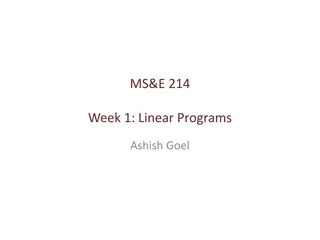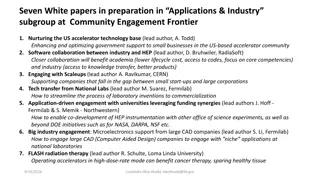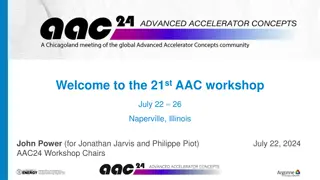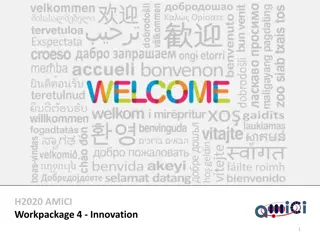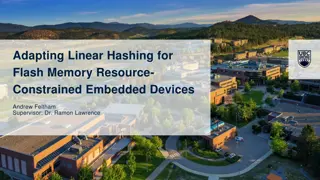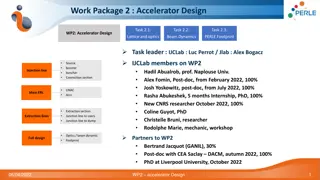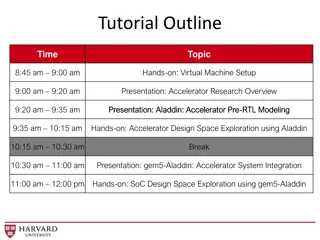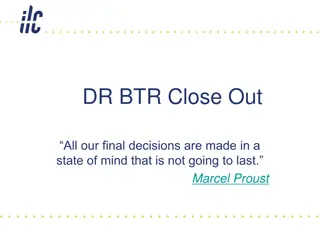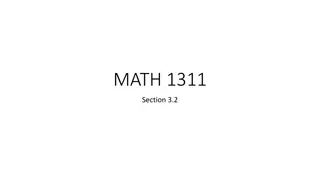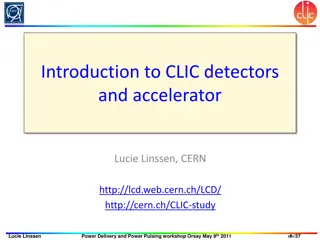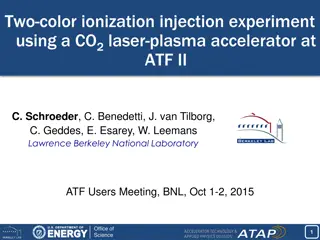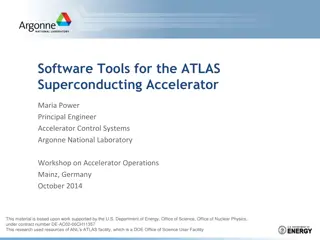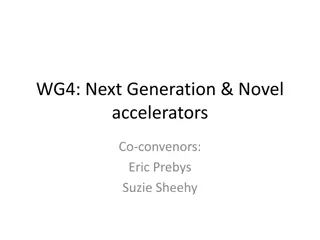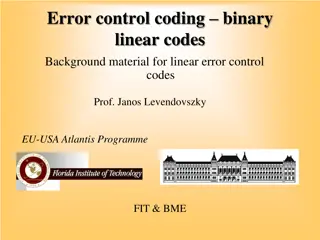Current Trends in High Energy Accelerator Developments
Explore the latest trends in high energy accelerator development as discussed by experts from various institutes around the world, including proposals from China and existing accelerator projects. Learn about the classification of accelerator facilities based on size and the ongoing evolution of fut
0 views • 36 slides
European Particle Physics Strategy Update & Accelerator R&D Overview
European Particle Physics Strategy updates serve as the cornerstone for long-term decision-making in the field, with a focus on Accelerator R&D for High Energy Physics. The update process involves key questions, R&D strategies for RF technologies, and implementation plans. Approved strategies emphas
7 views • 25 slides
Accelerator R&D for High-Energy Physics: Advancements and Future Prospects
Vladimir Shiltsev's presentation at DPF-PHENO 2024 discusses the evolution of accelerator R&D in high-energy physics, emphasizing the need for off-shore Higgs factories and targeted collider developments. The P5 recommendations underscore the importance of engaging in feasibility studies for advance
0 views • 28 slides
Understanding Linear Discrimination for Classification
Linear discrimination is a method for classifying data where examples from one class are separable from others. It involves using linear models or high-order functions like quadratic to map inputs to class separable spaces. This approach can be further categorized as class-based or boundary-based, e
3 views • 37 slides
Understanding Linear Reservoir Baseflow Method
The linear reservoir baseflow method utilizes linear reservoirs to simulate the movement of water infiltrated into the soil. This method models water movement from the land surface to the stream network by integrating a linear relationship between storage and discharge. Users can select from one, tw
0 views • 11 slides
Understanding Linear Transformations and Matrices in Mathematics
Linear transformations play a crucial role in the study of vector spaces and matrices. They involve mapping vectors from one space to another while maintaining certain properties. This summary covers the introduction to linear transformations, the kernel and range of a transformation, matrices for l
0 views • 85 slides
Understanding Linear Programming: An Introduction to Optimization
Linear programming, introduced by mathematician George B. Dantzig in 1947, is a mathematical technique for optimizing resource allocation in a systematic manner. It involves formulating linear relationships among variables to achieve desired results like cost minimization or profit maximization. Lin
1 views • 60 slides
Comprehensive Overview of Numerical Linear Algebra Methods for Solving Linear Systems
Explore numerical linear algebra techniques for solving linear systems of equations, including direct and iterative methods. Delve into topics like Gaussian elimination, LU factorization, band solvers, sparse solvers, iterative techniques, and more. Gain insights into basic iterative methods, error
6 views • 12 slides
Government Contractors Basics for Beginners with OK APEX Accelerator
Explore the essentials of government contracting for beginners, including details about OK APEX Accelerator (formerly PTAC), the services offered, NAICS codes, SAM registration, and more. Learn how APEX Accelerator assists businesses in participating in government contracts, offering counseling, ass
0 views • 20 slides
Accelerator Technology R&D Targets and Sources Overview
The SnowMass2021 Accelerator Frontier AF7 focuses on Accelerator Technology R&D, exploring targets and sources such as high brightness electron sources, muon sources, and high intensity ion sources. The community planning meeting discussed various Letter of Interest submissions outlining innovative
0 views • 7 slides
Accelerator Science and Beam Physics Research Overview at US National Laboratories
US high-energy physics faces budget challenges despite the need for support to remain competitive. John Power from Argonne National Laboratory discusses the importance of funding for core research and accelerator science. The GARD program in the Department of Energy Office of High Energy Physics pro
0 views • 25 slides
Linear Beam Optics and Particle Motion in Accelerator Physics
Explore the fundamental concepts of linear beam optics and particle motion in accelerator physics, covering topics such as design trajectory, path length, phase advance, transfer matrix, and more. Understand the intricacies of designing accelerators and the mathematical representations involved in o
0 views • 78 slides
Safety Assessment and Accelerator Safety Envelope Review
Overview of the Safety Assessment Document (SAD) and Accelerator Safety Envelope (ASE) process for the 400 MeV Test Area (MTA) at Fermilab. The document details the shielding assessment, approval process by various committees, and updates made to the SAD chapters and the Accelerator Safety Envelope.
4 views • 8 slides
Integration of USI and CM at NSLS-II 2019 Accelerator Safety Workshop
This document outlines the Integration of Unreviewed Safety Issues (USI) and Configuration Management (CM) at the NSLS-II 2019 Accelerator Safety Workshop conducted at the ORNL Spallation Neutron Source. It covers the USI process, screening evaluations, training, and qualifications necessary for the
0 views • 13 slides
Understanding Linear Dependent and Independent Vectors
In linear algebra, when exploring systems of linear equations and vector sets, it is crucial to distinguish between linear dependent and independent vectors. Linear dependence occurs when one vector can be expressed as a combination of others, leading to various solutions or lack thereof in the give
0 views • 20 slides
Magnetization, Decay, and Error Fields in HTS Accelerator Magnets
The research conducted at The Ohio State University focuses on understanding the magnetization, decay, and influence of error fields in high-temperature superconducting (HTS) accelerator magnets. The study explores the impact of different superconducting materials such as Nb3Sn, YBCO, and Bi:2212 on
0 views • 21 slides
Future Prospects and Evolving Ideas for the CERN Accelerator School
The CERN Accelerator School is planning upcoming schools and venues, with proposals for its evolution presented. Courses cover various topics across Member States, with a focus on advanced accelerator physics. A future HEP Collider School is also in the pipeline. Suggestions for improvement include
0 views • 16 slides
Converting Left Linear Grammar to Right Linear Grammar
Learn about linear grammars, left linear grammars, and right linear grammars. Discover why left linear grammars are considered complex and how right linear grammars offer a simpler solution. Explore the process of converting a left linear grammar to a right linear grammar using a specific algorithm.
0 views • 44 slides
CO2-Laser-Driven Dielectric Laser Accelerator Proposal
Study and experimental demonstration of a CO2-laser-driven dielectric laser accelerator, addressing the limitations of current accelerator technologies by utilizing longer laser wavelengths for increased charge and improved beam control. The proposal aims to develop a novel in-vacuo scheme for ultra
0 views • 13 slides
Breakdown Test of SW Accelerator Cavity with Shaped Iris
In a study by J.M. Neilson, V. Dolgashev, and S. Tantawi at SLAC National Accelerator Laboratory, planned breakdown tests were conducted on a single-cell SW accelerator cavity with shaped iris geometries. The research assessed breakdown dependence, different iris parameters, and compared elliptical
0 views • 10 slides
Future of Accelerator Technologies: Enhancing Colliders and R&D Programs
The Accelerator Frontier Panel discusses the crucial components to enable future accelerators, emphasizing the need for a National Future Collider R&D Program, General Accelerator R&D, and adequate accelerator and test facilities. The message stresses the importance of an integrated future collider
0 views • 17 slides
Recommendations for Advancing Beam Physics and Accelerator Education
The exploration of new physics demands future accelerators beyond 1 TeV lepton colliders and 100 TeV hadron colliders, requiring luminosity in a specific range. Various challenges, including reaching quantum limits, face conventional RF-based beams. The pursuit of disruptive acceleration technologie
0 views • 7 slides
European Plasma Research Accelerator with Excellence in Applications
The European Plasma Research Accelerator project, also known as EuPRAXIA, is a cutting-edge initiative that aims to develop a laser driver for advanced accelerator concepts. Led by a team of experts from various European countries, the project focuses on laser requirements, overall layout, thermal m
0 views • 33 slides
Analog Accelerator: Memristor Basics and ISAAC Accelerator
Explore the world of analog acceleration with topics covering memristor basics and the ISAAC accelerator. From understanding noisy analog phenomena to leveraging wires as ALUs, delve into crossbars for vector-matrix multiplication and the challenges of high ADC/DAC area/energy. Discover solutions li
0 views • 23 slides
Understanding Linear Optimization in MS&E 214
Linear optimization involves maximizing or minimizing a linear function subject to constraints. This week's focus in MS&E 214 is on linear programming, basic feasible solutions, duality theory, and extreme point solutions. The concept of linear programs, such as the example of maximizing x + 3y subj
0 views • 36 slides
Engaging Innovation in Accelerator Technology and Industry Partnerships
This collection of seven white papers explores a variety of topics in the fields of accelerator technology and industry collaborations. Topics range from nurturing the US accelerator technology base to enhancing government support for small businesses in the accelerator community. The papers also de
0 views • 6 slides
Advanced Accelerator Concepts Workshop Highlights and Vision
The 21st AAC workshop held in Naperville, Illinois, showcased research on advanced accelerator physics and engineering. Key themes included developing cost-effective facilities for high-energy physics and photon science, as well as compact facilities for industrial, medical, and security application
0 views • 10 slides
Advancing European Innovation in Accelerator and Magnet Technologies
The AMICI H2020 project aims to enhance collaboration between European companies to drive innovation in mature Accelerator and Magnet technologies. Through round table discussions, the project seeks to identify opportunities for industry engagement, establish collaborative frameworks, and optimize t
0 views • 17 slides
Workshop on Maintaining PIP-II within the Accelerator Complex - Operational Requirements and Interfaces
This workshop, held on July 15, 2021, focuses on maintaining the PIP-II within the Accelerator Complex through discussions on uptime, availability, maintainability, and operability requirements. The event covers various presentations on system interfaces, maintenance strategies, and operational expe
0 views • 4 slides
Adapting Linear Hashing for Flash Memory Constrained Embedded Devices
This research explores the adaptation of linear hashing for improved data handling on flash memory-constrained embedded devices. Motivated by the increasing data collection by IoT devices, the study focuses on implementing database structures like a linear hash table for efficient data processing. T
0 views • 67 slides
Accelerator Design and DC Photogun Project Overview
This project overview outlines the tasks and goals related to Accelerator Design and DC Photogun within Work Packages 2 and 3. It includes details on team members, task leaders, activities, equipment, international collaborators, and identified contributors. Key focus areas encompass accelerator des
0 views • 13 slides
Accelerator Design Space Exploration Tutorial
This tutorial covers hands-on activities and presentations on virtual machine setup, accelerator research overview, RTL modeling, design space exploration using Aladdin, gem5-Aladdin for system integration, and SoC design space exploration. Aladdin, a pre-RTL power-performance accelerator simulator,
0 views • 52 slides
Advanced Particle Accelerator Project Updates
Explore the latest updates on the advanced particle accelerator project, including decisions on operating scenarios, lattice parameters, RF considerations, and construction criteria for the accelerator facility. Cost adjustments, upgrade plans, and timelines for key components are discussed, emphasi
0 views • 9 slides
Understanding Linear Functions in Mathematics
Linear functions play a crucial role in mathematics, focusing on elements like rate of change and initial value. Through examples involving daily car rental costs and profit from selling birdhouses, this content explores the concept of linear functions and how they are applied in real-life scenarios
0 views • 13 slides
Overview of CLIC Detectors and Accelerator Studies
CLIC detectors and accelerator studies aim to explore new physics beyond the current energy scales reached by the LHC. The CLIC project focuses on a linear collider for e+e- collisions, with an energy reach up to 3 TeV. The two-beam scheme, detector concepts, challenges, and comparison to the LHC ar
0 views • 59 slides
Two-Color Ionization Injection Experiment Using CO2 Laser-Plasma Accelerator
This experiment conducted at ATF II focused on generating beams with ultra-low transverse emittance utilizing two-color ionization injection with a CO2 laser-plasma accelerator. The technique involves using a pump laser pulse in circular polarization and an injection laser pulse in linear polarizati
0 views • 15 slides
Control System Overview for ATLAS Superconducting Accelerator
The ATLAS Control System Group manages control systems from ion sources to specified areas, utilizing hardware such as AlphaServer and various controllers. Software tools from Vista Control Systems offer real-time control functionalities for OpenVMS, Linux, and Windows. Data management includes CAMA
0 views • 17 slides
Innovative Next-Generation Accelerator Technologies Conference
Explore cutting-edge accelerator technologies at the WG4 Next Generation & Novel Accelerators conference, led by Co-convenors Eric Prebys and Suzie Sheehy. Dive into sessions covering advancements in accelerator science, with detailed insights shared in WG Sessions 1 to 5. Uncover the future of acce
0 views • 6 slides
Understanding Linear and Nonlinear Functions in Mathematics
Explore the concepts of linear and nonlinear functions in mathematics through identifying linear and nonlinear functions from graphs, understanding the characteristics of linear functions, and identifying linear functions from tables. Learn about the constant rate of change, slope, and how to determ
0 views • 49 slides
Understanding Linear Error Control Coding and Syndrome Detection in Binary Linear Codes
Delve into the world of linear error control coding, guided by Prof. Janos Levendovszky, as we explore the development of linear codes, message vectors, error groups, and the process of selecting group leaders with detailed examples. Discover how syndrome detection and decoding tables play a crucial
0 views • 27 slides


